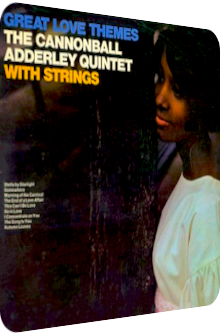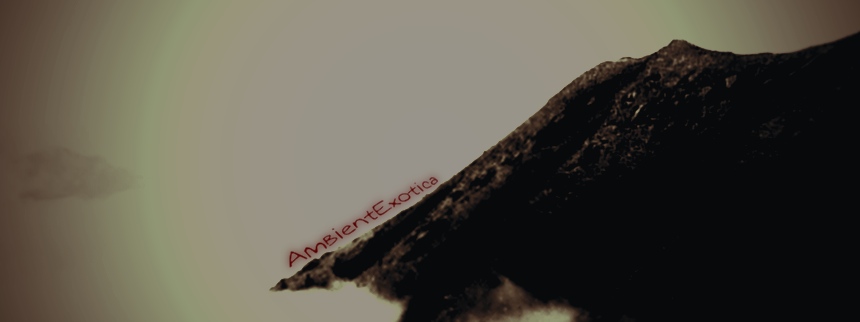
Cannonball Adderley Quintet
Great Love Themes
1966
Great Love Themes by the Cannonball Adderley Quintet is based on a formula that is surprisingly popular in the late 50’s and throughout the 60’s: converging the eclecticism of Jazz with the sylphlike streams of string-focused orchestras. There’s no better and more compatible heritage to prove the success of this mélange than romantic songs and love themes. Recorded in April 1966 in New York and released in the same year on Capitol Records, the nine love-themed compositions of Broadway origin are realized by Julian Edwin »Cannonball« Adderley (1928–1975) on the alto saxophone, Nathaniel »Nat« Adderley (1931–2000) on the cornet, Joe Zawinul on the piano, Herbie Lewis on the double bass and Roy McCurdy on the drums. As expected, there’s more personnel involved, led, arranged and conducted by Ray Ellis: a battery of strings, two harps, a vibraphone (which makes for an interesting addition overall) and a choir of three femmes are included to embellish the combo.
Unfortunately, the level of success is often questionable. In its very best moments, the synthesis of Jazz with the symphonic world works flawlessly, and both the orchestra and the quintet are closely tied to each other, augmenting each sphere with a great counterpoint. This allure more often than not leads to a stronger emphasis on the strings though, extending the danger of love albums by making them overly sugar-sweet. This is not the area of expertise of Cannonball Adderley – at least not until 1974’s Love, Sex, And The Zodiac – so the looming danger of arbitrarily besotted smoochware is in the air indeed. Since there are moments and even complete arrangements of greatness to be found in this album, it deserves a closer look after all.
Leonard Bernstein’s famous Somewhere is the gateway to Cannonball Adderley’s tryst with Ray Ellis’ orchestra. Such being the case, heartwarming strings, viscid harps and aeriform vibraphone droplets become enmeshed with Adderley’s alto saxophone which protrudes the warm hue of streamlined legato washes without any prongs. Joe Zawinul’s piano, aureate and mellow, rounds off the lovestoned magic. Jerome Kern’s and Oscar Hammerstein II’s The Song Is You meanwhile carves out the wordless vocals of the lead seductresses whose oooh-ooohing adjuvants serve as simply another instrument within the amethystine concupiscence and overall elation in this piece. The Cannonball Adderley Quintet can make this song their own however!
The second section is pure Jazz delight, with Herbie Lewis’ bass pericarps and Roy McCurdy’s drums suddenly forming a tributary that leads away from the streamlined standstill, revving up the energy good. While Jacques Prévert’s, Johnny Mercer’s and Joseph Kosma’s Autumn Leaves turns out to be a similarly successful synthesis of a symphonic bokeh with a comparatively fast-paced foreground of metropolitan flavors via Nat Adderley’s cornet protrusions in-between silvery hi-hats, Cole Porter’s I Concentrate On You is another swinging piece which moves and strolls; percolating string rivers provide the susurrant backdrop for Cannonball’s energetic sax punctilio. Lorenz Hart’s and Richard Rodgers’ This Can´t Be Love then rounds off the jazzy adventure, luring with its uplifting rhythms, heterodyned brass sinews and aerose violins. McCurdy’s drum kit serves as the effervescent aorta throughout this last song of side A, boosting its liveliness.
Side B is not as successful in breaking the primary tendency shown by such records where the strings take over for good and remain in a superior position for better or worse. Well, Ned Washington’s and Victor Young’s Stella By Starlight might be seen as a misstep in this regard indeed, as Cannonball Adderley and his men willfully succumb to the saccharified epithelium of rose-tinted strings. The alto saxophone is in sync with the surroundings, and once the composition reaches its apex, chintzy eruptions of love and languor leave a shallow aftertaste. The textures themselves are fabulous, the melody that of a classic, and yet is the synergy amiss, the compatibility at a low.
Luiz Bonfá’s Morning Of The Carnival meanwhile surprises with stacked ophidian polyphonies of the Adderley Bros.' brass instruments which even outshine the etiolated thicket of semi-mournful strings. A surprisingly contemplative interpretation of an otherwise beguiling high-energy classic. While Edward Redding’s The End Of A Love Affair is a return to form as it shapes bursts of vivacious string fanfares and unites it with Zawinul’s matutinal aura of the piano keys in tandem with wondrously complex sax spirals amid rhythm-driven segues, Cole Porter’s So In Love makes for a splendid finale in an amicably turbulent journey through the city with a loved person by one's side. The melodies, while open to scrutiny, are rather complex, and textural variety as well as ever-changing team-ups and newly attached patterns make this one a great love theme indeed.
Great Love Themes is the famous mixed bag, thumb is tending to show sidewards, i.e. the wrong direction when talking about string-infused interpretations of Jazz standards. The Cannonball Adderley Quintet faces a situation that has taken place time and again in the world of music, namely maintaining the typical – even archetypical – style the band is known for which is coupled with the expected setup of a true-spirited Jazz album… in a surrounding that is at first foreign to the species of such records. A final, all-encompassing evaluatuon of the Ray Ellis Orchestra and its craftsmanship is thus hard to declare. They violinists and harpists are undoubtedly a force to reckon with, especially so in the given theme. They remain in the background most of the time, breaking out whenever it is needed… or rather not.
Arrangements such as Stella By Starlight showcase an inordinacy, an overstatement of the strings. This is a love-themed album alright, one which is rightfully capturing the joyous bursts and ebullient emotions, there’s nothing wrong with that, but the balance is not maintained and stands in great contradiction with Cannonball Adderley’s progressive, almost timeless slickness of his saxophone melodies. Feelings of overwhelmingness have a cooler edge within a dedicated Jazz setting, but here – and not just in this particular song – they are amplified in the wrong way, crossing the threshold to insipid lands. With these limitations in mind, Great Love Themes remains a valuable album only for the Space-Age connoisseur or the admirer of romantic themes. Dominic Frontiere’s Love Eyes (1960) is the better choice though, as its reciprocation between Jazz and symphonies works out far better, but Cannonball Adderley and his men know to enchant… and to anticipate the 70’s.
Exotica Review 493: Cannonball Adderley – Great Love Themes (1966). Originally published on Mar. 22, 2018 at AmbientExotica.com.
